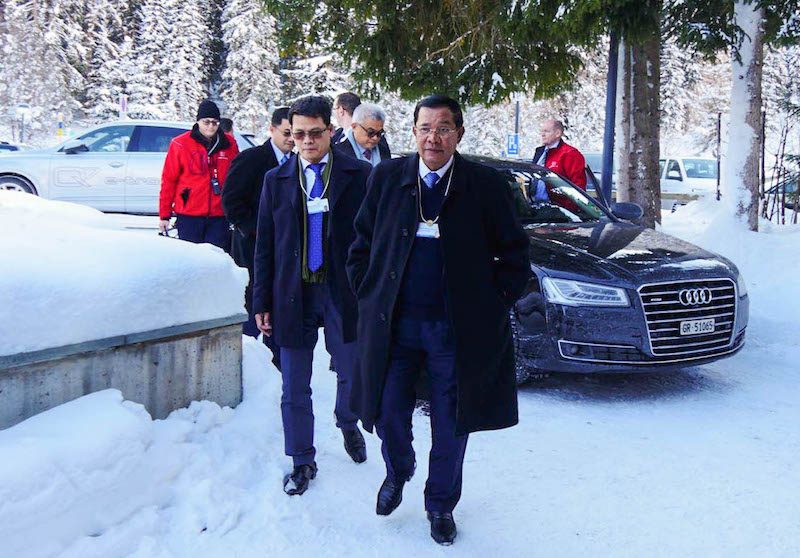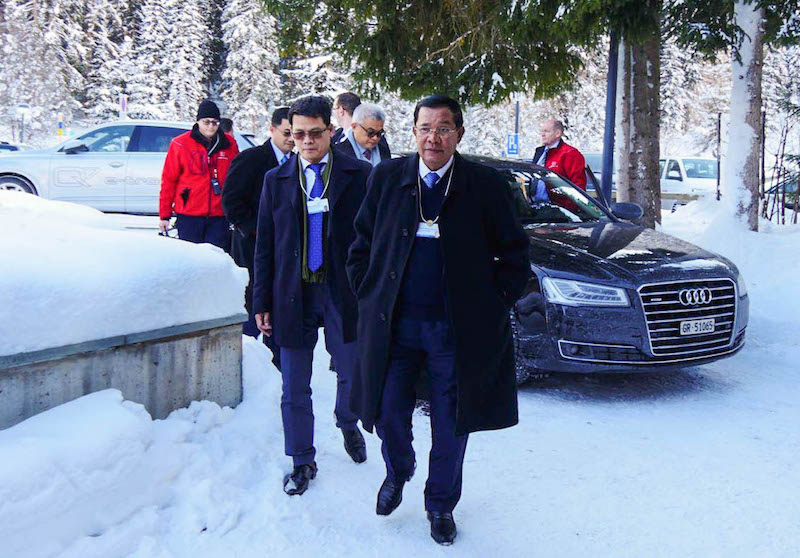Prime Minister Hun Sen has a message for the world: Cambodia wants your investment and acquiescence. He has spent much of the past year telling foreign countries to stay out of Cambodia’s business, but spent the past week in Davos wooing global dealmakers.
On his way there, he found time to make his latest move in a campaign to marginalize his political opposition, calling for an end to a “culture of dialogue” that was born from domestic and international pressure.

In the past two years, his government has taken more than 30 political prisoners, according to rights group Licadho, as part of what is widely seen as a heavy-handed crusade to silence dissent ahead of an unpredictable national election next year.
But it’s a very different view of Cambodia that Mr. Hun Sen had been peddling at the annual World Economic Forum in Switzerland, which this year had the overarching theme of “Responsive and Responsible Leadership.”
Mr. Hun Sen would “seize the opportunity at the WEF to showcase ASEAN and promote Cambodia at a special session titled ‘Cambodia: The rising star of ASEAN,’” according to a Foreign Affairs Ministry statement released last week.
“Many Swiss investors want to do business in Cambodia because they have confidence and clearly see political stability and development, notably Cambodia’s current economic potential,” Mr. Hun Sen said in a Facebook post on Monday.
As an emerging economy with an impressive annual growth rate of about 7 percent, Cambodia is seen by many as a good bet for investors. But others question who benefits when foreign money enters the Cambodian market, and whether Mr. Hun Sen is the best pitchman to convince those who might be wary of investing their money in what is seen as one of the world’s most corrupt countries.
“Cambodia does have a lot of potential, but we have not realized this potential because of the current leadership,” Kem Monovithya, the opposition
CNRP’s deputy director of public affairs, said in an email yesterday.
“The political climate continues to be volatile and is expected to worsen as elections near. Ruling elites talk of civil war if they lose the election. This is not stability. This is volatility, as Cambodia is governed according to one person’s mood and not a system.”
“Volatility means a big risk to investors,” she added. “A good pitch alone won’t seal the deal. The government needs to demonstrate credibility in real reforms.”
During a news conference in Davos on Wednesday, Mr. Hun Sen discussed the importance of collaborating with the private sector. “We need to mobilize all resources from the private sector to support the project of infrastructure development,” he said.
It was announced at the conference that Cambodia had become the first Asian state to join the Sustainable Development Investment Partnership, a group of governments, banks, aid agencies and other financiers promoting public-private partnerships and joint financing for infrastructure projects in poor countries.
Mr. Hun Sen called the joint financing mechanism a “win-win policy,” the same term he has applied to his successful effort to end decades of civil war in Cambodia.
The press event was one of two in which the prime minister was scheduled to participate during the forum, which ends today. Ms. Monovithya welcomed the platform allotted to Cambodia at the World Economic Forum—with reservations.
“We are all pleased when doors are open for our country, but we caution how these opportunities are being used by the people running the country,” she said. “The reality is this government can’t curb corruption, and we cannot attract large-scale, legitimate investments because of it.”
Commerce Ministry spokeswoman Soeung Sophary acknowledged the country’s problems with corruption, but said that was no reason to stop promoting Cambodia to investors.
“If we just stop promoting trade because of these problems, then we wouldn’t have improved,” Ms. Sophary said. “I am optimistic that we will improve more, given that we admit that corruption is a problem in Cambodia, but other countries also have the same problems.”
Global Witness, which releasing a damning report last year on the vast business holdings of Mr. Hun Sen’s family, was not so optimistic about the possibility for positive change under the prime minister. The watchdog blasted the WEF in a statement released on Wednesday for providing Mr. Hun Sen with a stage from which to recruit investors.
“The premier’s regime is propped up by a huge network of secret deal-making and nepotism that emanates from the Hun family and underpins the Cambodian economy. This reality poses huge legal, financial and reputational risks for investors,” the statement said.
“The Davos summit claims to be ‘committed to improving the state of the world’. If this is true, it should close its doors to despots like Hun Sen,” Alice Harrison, a communications adviser at Global Witness, said in the statement.
Mr. Hun Sen will have the forum’s spotlight again in May when Cambodia hosts the World Economic Forum on Asean, just a month before commune elections and during a period when investment is likely to dip as anxiety around elections spikes.
“Currently, our forecasts see a softening in overall investment spending in 2017-18 compared with the past few years,” Miguel Chanco, a regional analyst for the Economist Intelligence Unit, said in an email. “The political environment is likely to remain fragile until after the dust settles following the 2018 general election.”
Still, Mr. Chanco said he wouldn’t be surprised if Mr. Hun Sen was successful in courting foreign firms. “Investors will continue to find Cambodia attractive primarily because labour costs remain competitive and it boasts a liberal foreign investment regime,” he said.
As for the impact of corruption on investing, Mr. Chanco said smaller businesses were hurt most because these firms are least able to absorb the illicit costs of doing business.
For larger companies, “corruption is already ‘priced-in’ when investors look to Cambodia for opportunities,” he said.
Despite the need for additional financial regulatory controls and reliable, competitively priced electricity, Cambodia’s open economy and rising investments in education and infrastructure made it “a very promising place for investment,” said Jayant Menon, an economist at the Asian Development Bank.
“Cambodia has clearly presented itself as an open economy, inviting to foreign investors,” Mr. Menon said. “It’s not just advertising. It’s reforms that people are being made aware of.”
(Additional reporting by Hang Sokunthea)




